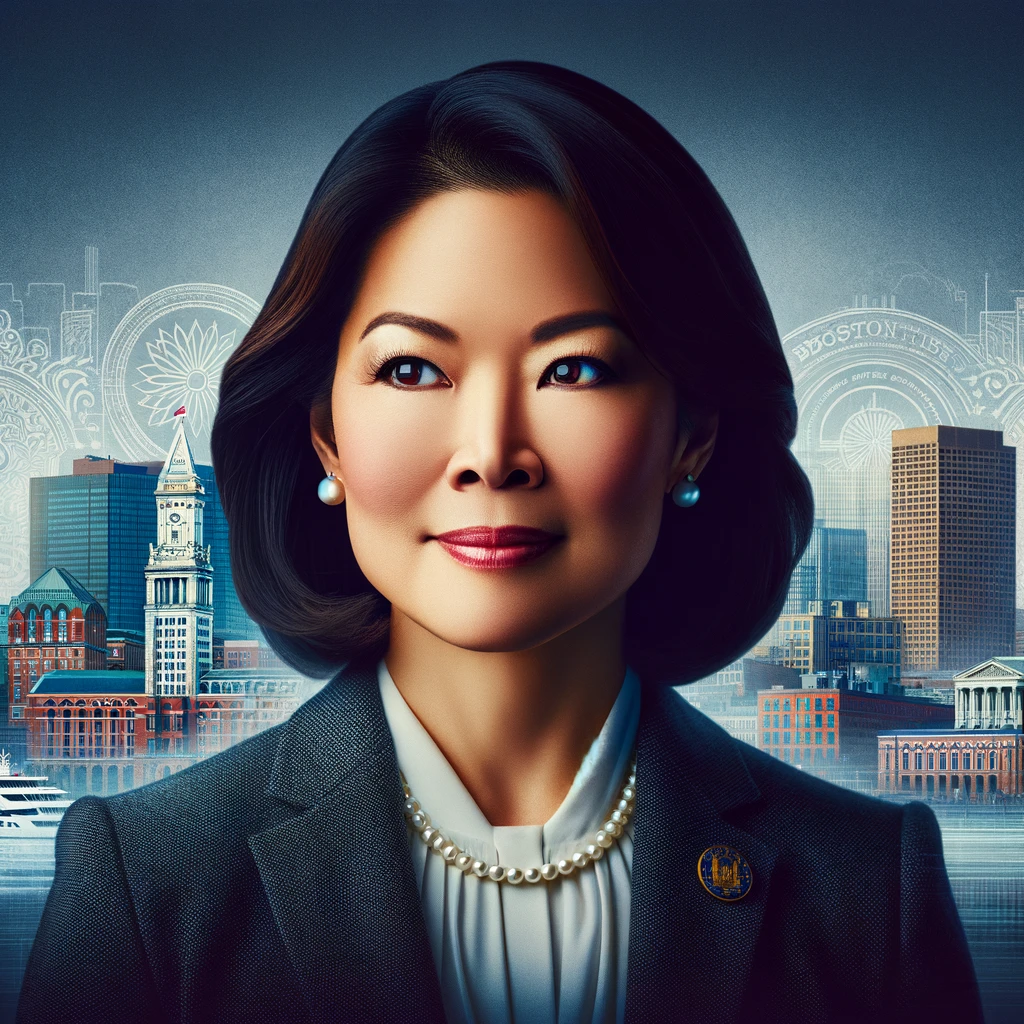Michelle Wu, a trailblazing political figure, made history when she was elected as the Mayor of Boston in 2021. Her election marked a significant moment for the city, as she became the first woman, and the first person of color, to hold the office. Wu’s journey to the mayorship and her vision for Boston encapsulate her commitment to progressive policies and inclusive governance.
Early Life and Education: Michelle Wu’s story begins with her family’s immigrant roots. Born to Taiwanese immigrants, Wu grew up in Chicago, where she witnessed the challenges and opportunities of immigrant life in America. Her early experiences shaped her understanding of community and public service. Wu attended Harvard University and Harvard Law School, where she was mentored by Elizabeth Warren, then a law professor and now a U.S. Senator.
Political Career and Boston City Council: Wu’s political career started in Boston, where she settled after her studies. She was first elected to the Boston City Council in 2013, becoming the first Asian American woman to serve on the council. During her tenure, she advocated for progressive causes, including climate action, affordable housing, and public transportation reform.
Mayoral Campaign and Victory: Michelle Wu’s mayoral campaign was built on a platform of bold, progressive change, addressing issues like racial equity, economic justice, and climate resilience. Her message resonated with a wide range of voters, leading to her historic victory. Wu’s election was seen as a bellwether for the growing influence of progressive politics in urban governance.
Vision for Boston: As mayor, Michelle Wu has focused on tackling some of Boston’s most pressing challenges. She has prioritized initiatives around climate action, aiming to make Boston a leader in sustainability and environmental justice. Wu has also been an advocate for affordable housing and equitable economic development, recognizing the city’s need to be accessible and prosperous for all its residents.
Impact and Representation: Wu’s leadership extends beyond policy implementation. Her presence as a young, Asian American woman in a major city’s highest office has been inspirational for many, symbolizing a shift towards more diverse and representative political leadership. Her approach to governance, often collaborative and community-focused, has been a hallmark of her administration.
Looking Ahead: Mayor Michelle Wu’s tenure is closely watched as a model for progressive urban leadership. Her efforts to address complex issues in one of America’s oldest and most dynamic cities are seen as indicative of the potential for transformative change at the local government level.
Michelle Wu’s story is not just about her historic election but also about the ideas and values she represents. In leading Boston, she embodies a new era of leadership, one that is inclusive, forward-thinking, and unafraid to tackle long-standing challenges with innovative solutions.
As with any political figure, Mayor Michelle Wu’s tenure has not been without controversy and criticism. It’s important to approach these aspects with a balanced perspective, acknowledging the complexities of governing a major city like Boston. Here are some areas where Mayor Wu has faced challenges and criticism:
- Policy Implementation: Some of Wu’s policies, particularly those that are more progressive or represent significant shifts from the status quo, have been met with resistance. Critics argue that certain policies may be too ambitious or not feasible, potentially causing unintended consequences for the city and its residents.
- Housing and Development: While Wu has advocated for affordable housing, her approach to development and housing policies has faced scrutiny. Critics have pointed out potential challenges in balancing the need for more affordable housing with the interests of developers and existing neighborhoods.
- Transportation and Infrastructure: Wu’s plans to reform Boston’s public transportation system and infrastructure have been ambitious. However, she has faced criticism over the pace of implementation and the practicality of some proposals, especially concerning budget constraints and potential disruptions during construction.
- Economic Concerns: Some business leaders and critics have expressed concerns about how Wu’s policies might impact the local economy, particularly regarding taxation and regulation. The challenge lies in fostering economic growth while implementing progressive policies.
- Public Safety and Law Enforcement: Public safety is a critical issue for any mayor. Wu’s approach to law enforcement and public safety, particularly in how she balances community needs with law enforcement resources, has been a point of debate.
- Political Divisions: As a progressive leader in a time of heightened political polarization, Wu has faced opposition from more conservative segments of the population and political spectrum. Balancing diverse viewpoints and uniting different factions of the city is a continual challenge.
It’s important to note that criticism and controversy are inherent in political leadership, especially in a diverse and complex city like Boston. Mayor Wu’s policies and decisions are subject to public scrutiny and debate, which is a fundamental aspect of democratic governance. Understanding the criticisms she faces provides a more comprehensive view of her tenure as mayor and the challenges of city leadership.

